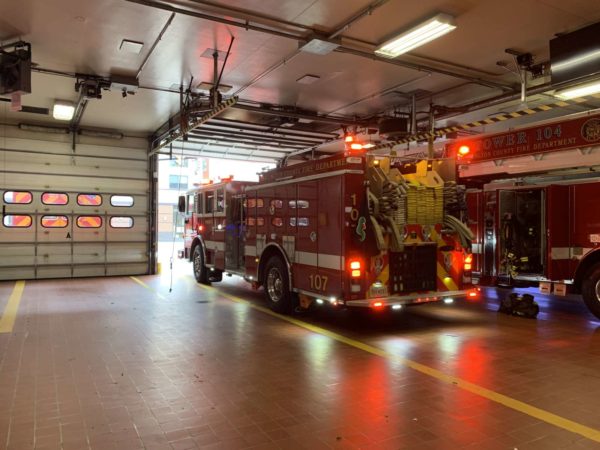With two cases now confirmed in Arlington, coronavirus is here and spreading. The Arlington County Fire Department, however, says it’s prepared.
“As other organizations begin taking steps to limit chances of exposure to coronavirus, we are prepared to respond to it,” the department said today on social media. “In consultation with [the Centers for Disease Control] and [Arlington Dept. of Human Services], we have the plans and equipment to safely handle potential cases while keeping our members safe.”
“We’re going to be restricting some of our activity,” ACFD spokesman Capt. Justin Tirelli tells ARLnow. While firefighters will still be responding to calls as usual, activities like school groups visiting firehouses and other public events at stations will be cancelled.
Tirelli said firefighters already take “standard precautions” for flu cases — precautions are applicable to coronavirus.
For calls involving patients with flu-like symptoms, firefighters will wear masks, eye protection, gloves and gowns, and will then put a mask on the patient, Tirelli said. After a transport to the hospital for a patient with flu or coronavirus-like symptoms, per standard procedure, the ambulance’s passenger compartment and stretcher will be cleaned with hospital-grade disinfectant.
Tirelli noted that the fire department has not seen a noticeable uptick in calls for people with flu-like symptoms, but ACFD is expecting such calls to increase as the outbreak worsens.
“The question is whether it’s a drastic and sudden increase or a gradual increase,” he said. “We’re hoping for [gradual].”
Tirelli has some suggestions for Arlington residents. First, don’t call 911 or the Emergency Communications Center for general questions or advice, as many people have been doing — the Virginia Dept. of Health has a call center for that: 1-877-ASK-VDH3 (275-8343).
Second, follow the advice of experts to help prevent the spread of disease — everything from frequent hand washing to avoiding large crowds.
“Taking on the extra responsibility of not being around a lot of people is really key,” Tirelli said. “People have to live, we know you have to go to the grocery store, but if you can avoid large gatherings and events… it’s not going to eliminate the illness, but it’s going to slow the spread. A rapid increase [in cases] is going to overwhelm the system and that’s what we don’t want.”
As other organizations begin taking steps to limit chances of exposure to #coronavirus, we are prepared to respond to it. In consultation with @CDCgov and @ArlingtonDHS, we have the plans and equipment to safely handle potential cases while keeping our members safe. #COVIDー19 pic.twitter.com/r7JEHqWPmJ
— Arlington Fire (@ArlingtonVaFD) March 12, 2020


